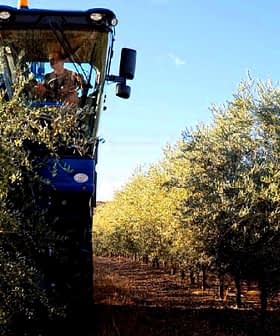While the olive harvest has already begun in some parts of Greece, predictions of a reduced yield of 215,000 tons and record-high prices have made olive oil a precious commodity for producers and consumers alike.
Prices at origin have climbed to between €8.50 and €9.20 per kilogram of low-acidity extra virgin olive oil. In supermarkets and other retailers, consumers face prices ranging from €9.00 to €16.00 for a liter of packaged extra virgin olive oil.
Incidents of olive oil theft have always occurred in Greece, and everywhere olive oil is produced. However, thefts are more common now that the oil is much more expensive.
The season’s extremes have also sparked a spate of olive oil thefts and illicit practices across the country this autumn.
At the Polygyros agricultural association in Chalkidiki, a whopping 37 tons of olive oil from last season’s harvest were reportedly stolen from the association’s premises, with some estimates putting the amount of the missing olive oil at more than 50 tons.
See Also:Olive Oil Thefts Rising in Mills and Supermarkets Across SpainLocal producers who are association members filed an official complaint against the association’s administrators, accusing them of embezzling the stored olive oil and claiming that the theft was an inside job.
“We’re talking about very big business,” said Manolis Yiannoulis, head of EDOE, the national interprofessional olive oil association.
“Thirty-seven tons in today’s market would be worth more than €300,000,” he added. “When olive oil prices in the last year have increased by 200 percent because of low yields, there is a lot of money to be made.”
In the village of Geraki near Heraklion in Crete, thieves targeted an elderly man’s house, stealing 200 kilograms of olive oil.
In Messinia in southern Peloponnese, intruders raided an olive oil mill in Analipsi, making off with around 100 kilograms of olive oil and equipment and causing damage to the mill facilities.
In the northern Greek region of Pella, the police arrested the owner of a local minimarket for selling olive oil of dubious origin and quality without having any legal purchase documents.
Around 500 liters of olive oil labeled extra virgin were found in the minimarket and confiscated by the authorities.
“Incidents of olive oil theft have always occurred in Greece and everywhere olive oil is produced,” Evangelos Panagakos, a miller based in Skala in the Lakonia region, told Olive Oil Times.
“However, thefts are more common now that the oil is much more expensive,“ he added. “Local growers and producers have not yet resorted to any measures, but with prices so high, there is widespread concern among them about the season’s olive oil and how to safeguard it better.”
Panagakos also noted that olive oil production in Skala and the neighboring territories is expected to align with the country’s general trend of reduced production and far lower than last year.
“We expect a 25 to 30 percent reduction in our area and most of southern Lakonia this season,” he said. “This is mostly due to the fruit setting of the olive trees being incomplete because of the mild winter.”
A drop in olive oil production is also expected for the Lakonia region, from 25,000 tons in the 2022/23 crop year to less than 20,000 tons in the current one.
On Crete, local producers are determined to protect this year’s limited but valuable olive harvest.
See Also:Storms in Greece Flood Olive Groves, Damage Trees“There may be cases where the olives are harvested by people who are not their rightful owner,” said Vaggelis Protegerakis, the head of the association of Heraklion olive oil producers.
“This has happened again in previous years when prices were not as high as they are now,” he added. “We are considering using GPS trackers that resemble olive fruits to track any stolen olives, similar to those our Spaniard counterparts have already put in use in their groves.”
Protogerakis said the region’s producers are considering hiring security agencies and patrolling the olive groves at night to prevent any theft of olives.
Olive oil production in Crete is expected to plummet this year compared to the 130,000 tons produced in 2022/23, reaching an estimated 30,000 to 35,000 tons for the whole island.
Apart from the thefts and the expected production decline, the country’s olive oil sector faces a steep drop in domestic consumption. In the past year, consumer demand for olive oil fell by 30 percent in the country.
“Our biggest fear is the decline [in consumption] we have seen in Greece,” said Yiorgos Economou, the general director of Sevitel, the association of Greek olive oil bottlers.
“People are opting for seed oils because they are one-third of the price,” he added. “Then there is the hesitation of countries like the United Kingdom, which are now thinking twice about importing [our] olive oils because of soaring costs.”
However, some industry experts have identified an asymmetry in the market, expressing concern that the ever-increasing prices of olive oil could eventually backfire.
“The country’s producers who today applaud [the high prices] should face things more realistically and try to balance the situation,” said Myron Hiletzakis, the deputy head of the agricultural association of Heraklion.
“Producers sold last year’s olive oil crop at €4.50 to €5 per kilogram, and these oils are now going for €13.50 a liter on the shelves,” Hiletzakis added.
“With producers’ prices at €8.50 per kilogram, rising to €10 with the added tax, consumer prices will eventually rise even further, perhaps to €20 or €25 for one liter,” he concluded. “All these could push us out of the market.”








